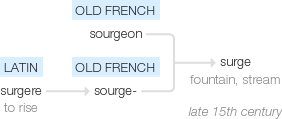Surge
late 15th century (in the sense ‘fountain, stream’): the noun (in early use) from Old French sourgeon ; the verb partly from the Old French stem sourge-, based on Latin surgere ‘to rise’. Early senses of the verb included ‘rise and fall on the waves’ and ‘swell with great force’.
wiktionary
From Middle English surgen, possibly from Middle French sourgir, from Old French surgir(“to rise, ride near the shore, arrive, land”), from Old Catalan surgir, from Latin surgō, contraction of surrigō, subrigō(“lift up, raise, erect; intransitive rise, arise, get up, spring up, grow, etc.”, transitive verb), from sub(“from below; up”) + regō(“to stretch”), ultimately from Proto-Indo-European *h₃réǵeti(“to straighten; right”), from the root *h₃reǵ-; see regent.
etymonline
surge (n.)
late 15c., "fountain, stream," of uncertain origin, probably from French sourge-, stem of sourdre "to rise, swell," from Latin surgere "to rise, arise, get up, mount up, ascend; attack," contraction of surrigere, from assimilated form of sub "up from below" (see sub-) + regere "to keep straight, guide" (from PIE root *reg- "move in a straight line," with derivatives meaning "to direct in a straight line," thus "to lead, rule"). Meaning "high, rolling swell of water" is from 1520s; figurative sense of "excited rising up" (as of feelings) is from 1510s.
surge (v.)
1510s, "to rise and fall," from surge (n.), or from French surgir "rise, ride (as a ship does a wave), spring up, arrive." Meaning "rise high and roll forcefully" is from 1560s. Related: Surged; surging.
